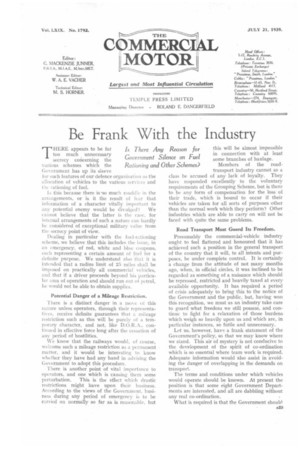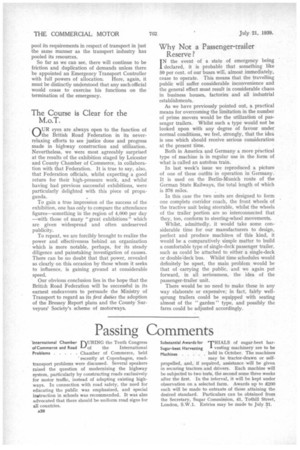Be Frank With the Industry
Page 27

Page 28

If you've noticed an error in this article please click here to report it so we can fix it.
THERE appears to be far too much unnecessary secrecy concerning the various schemes which the Government has up its sleeve lor such features of our defence organization as the allocation of vehicles to the various services and the rationing of fuel.
Is this because there is somuch muddle in the arrangements, or is it the result of fear that information of a character vitally important to any potential enemy would be divulged': We cannot believe that the latter is the case, for internal arrangements of such a .nature can hardly be considered of exceptional military value from the secrecy point of view.
Dealing in particular with the fuel-rationing scheme, we believe that this includes the issue, in an emergency, of red, white and blue coupons, each representing a certain amount of fuel for a definite purpose. We understand also that it is intended that a radius limit of 25 miles shall be imposed on practically all commercial vehicles, and that if a driver proceeds beyond his particular area of operation and should run out of petrol, lie would not be able to obtain supplies.
Potential Danger of a Mileage Restriction.
There is a distinct danger in a move of this nature unless operators, through their representatives, receive definite guarantees that a mileage restriction such as this will be purely of a temporary character, and not, like D.O.R.A.. continued in effective force long after the cessation of any period of hostilities. We know that the railways would, of course, welcome such a mileage restriction as a permanent matter, and it would be interesting to know whether they have had any hand in advising the Government to adopt this procedure.
There is another point of vital importance to operators, and one which is -causing them some perturbation. This is the effect which drastic restrictions might. have upon their business. According to -the views of the Government. business during any period of emergency is to be carried on normally so far as is reasonable, but this will be almost impossible in connection with at least some branches of haulage.
Members of the roadtransport industry cannot as a class be accused of any lack of loyalty. They have responded excellently to the voluntary requirements of the Grouping Scheme, but is there to be any form of compensation for the loss of their trade, which is bound to occur if their vehicles are taken for all sorts of purposes other than the normal work which they perform? Other industries which are able to carry on will not be faced with quite the same problems.
Road Transport Must Guard Its Freedom.
Presumably the commercial-vehicle industry ought to feel flattered and honoured that it has achieved such a position in the general transport of the country that it will, to all intents and purposes, be under complete control. It is certainly a change from the attitude of not many months ago, when, in official circles, it was inclined to be regarded as something of a nuisance which should be repressed, restricted and heavily taxed at every available opportunity. It has required a period of crisis adequately to bring this to the notice of the Government and the public, but, having won this recognition, we must as an industry take care to guard what freedom we still possess, and continue to fight for a relaxation of those burdens which weigh so heavily upon us and which are, in particular instances, so futile and unnecessary.
Let us, however, have a frank statement of the Government's policy, so that we may know where we stand. This air of mystery is not conducive to the development of the spirit of co-ordination which is so essential where team work is required. Adequate information would also assist in avoiding the danger of overlapping in the demands on transport.
The terms and conditions under which vehicles would operate should be known. At present the position is that some eight Government Departments are interested, and all are dabbling without any real co-ordination.
What is required is that the Government should pool its requirements in respect of transport in just the same manner as the transport industry has pooled its resources.
So far as we can see, there will continue to be friction and duplication of demands unless there be appointed an Emergency Transport Controller with full powers of allocation. Here, again, it must be distinctly understood that any such official would cease to exercise his functions on the termination of the emergency.
The Course is Clear for the M.o.T.
("NUR eyes are always open to the function of 1.—/the British Road Federation in its neverrelaxing efforts to see justice done and progress made in highway construction and utilization. Nevertheless, we were most agreeably surprised at the results of the exhibition staged by Leicester and County Chamber of Commerce, in collaboration with that Federation. It is true to say, also, that Federation officials, whilst expecting a good return for their high-pressure work, and whilst having had previous successful exhibitions, were particularly delighted with this piece of propaganda.
To gain a true impression of the success of the exhibition, one has only to compare the attendance figures—something in the region of 4,000 per day —with those of many "great exhibitions" which are given widespread and often undeserved publicity.
To repeat, we are forcibly brought to realize the power and effectiveness behind an organization which is more notable, perhaps, for its steady diligence and painstaking investigation of causes. There can be no doubt that that power, revealed so clearly on this occasion by those whom it seeks to influence, is gaining ground at considerable speed.
Our obvious conclusion lies in the hope that the British Road Federation will be successful in its earnest endeavours to persuade the Ministry of Transport to regard as its first duties the adoption of the Bressey Report plans and the County Surveyors' Society's scheme of motorways.
Why Not a Passenger-trailer Reserve?
IN the event of a state of emergency being declared, it is probable that something like 50 per cent. of our buses will, almost immediately, cease to operate. This means that the travelling public will suffer considerable inconvenience and the general effect must result in considerable chaos in business houses, factories and all industrial establishments.
As we have previously pointed out, a practical means for overcoming the limitation in the number of prime movers would be the utilization of passenger trailers. Whilst such a type would not be looked upon with any degree of favour under normal conditions, we feel, strongly, that the idea is one which should receive serious consideration at the present time.
Both in America and Germany a more practical type of machine is in regular use in the form of what is called an autobus train.
In last week's issue we reproduced a picture of one of these outfits in operation in Germany. It is used on the Berlin-Munich route of the German State Railways, the total length of which is 376 miles.
In this case the two units are designed to form one complete corridor coach, the front wheels of the tractive unit being steerable, whilst the wheels of the trailer portion are so interconnected that they, too, conform to steering-wheel movements.
Whilst, admittedly, it would take some considerable time for our manufacturers to design, perfect and produce machines of this kind, it would be a comparatively simple matter to build a comfortable type of single-deck passenger trailer, such as could be attached to either a single-deck or double:deck bus. Whilst time schedules would definitely be upset, the main problem would be that of carrying the public, and we again put forward, in all seriousness, the idea of the passenger-trailer unit.
There would be no need to make these in any way elaborate or expensive; in fact, fairly wellsprung trailers could be equipped with seating almost of the " garden" type, and possibly the fares could be adjusted accordingly.












































































